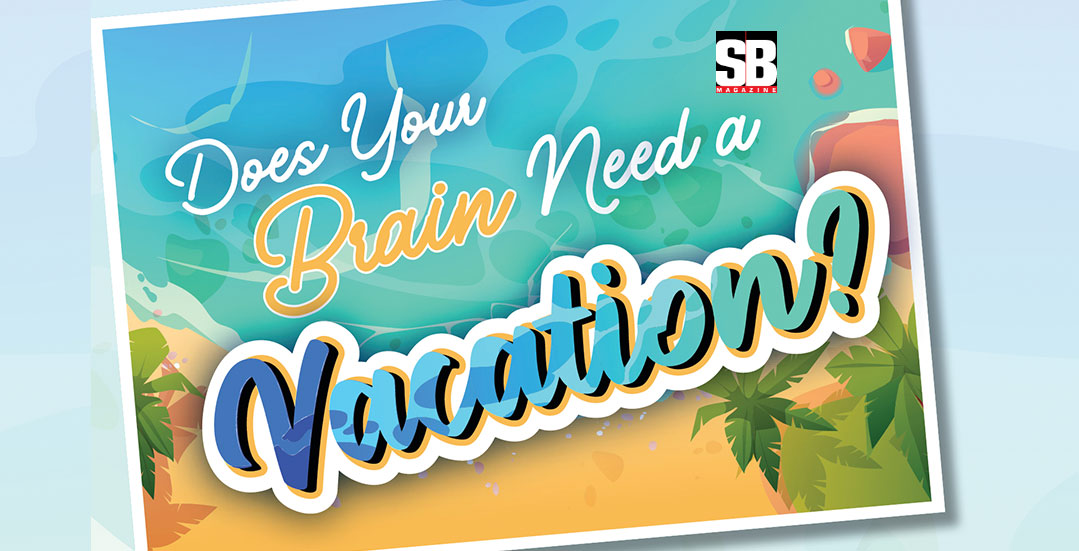Self-tanner, bikini and coverups on order! Vacation plans have started as summer quickly approaches. We get the flights, the hotels, and the beachwear ready but we often fail to plan for the brain. We work hard all winter and keep our heads down wearing and stressing our brains. Then we plan to relax and recharge our bodies but often forget that our brain needs a recharge too.
Using the environment to recharge your brain is an easy way to stay cognitively fit even while traveling! Repetition, especially in mental tasks or high intensity career work, causes extreme mental fatigue so taking a nature break is a great idea. But a break doesn’t have to wait for the beach. Taking mental breaks from those things that stress us allows nature to expose us to sensory input from natural sources.
Using nature to help the brain and body recalibrate their sensory-processing capabilities helps us to understand that we can teach ourselves to do anything, under any conditions, but not indefinitely as we are still physical beings. The brain is housed in a body that is very much rooted in the physical world and the toll we take on our bodies and brain must be paid. Becoming better than we are requires that we take this into account and work with it, rather than seek to separate the brain and the body hoping that it would somehow learn to work differently. Work smarter not harder. Use the environment as an aid to your cognitive skills and abilities.
We hear about summer brain drain and the summer slide for kids who are out of school. In order to work positively to counteract this, we assume that means we need as much academic push as possible. What it actually means is that we need to pace our brains rather than stress and stop. Pacing allows our brains and bodies to develop a natural or automatic rhythm rather than the fight or flight of stress and anxiety. The pacing includes using time “off” to still challenge the mind and body in a lesser stressed way, but still building towards a goal.
Olympians practice constantly but they also take breaks consistently because they understand that pacing is important to developing muscle memory and brain function. The summer slide or brain drain is real, not because our brains do nothing, but because we are not working them in a manner to stay fit. Picture it as a strict exercise regimen for 9 months then a complete nothing for 3 months. This is not sustainable to the body nor the brain. Consistency is the key.
Follow the ABCs of Summer Tips to avoid that summer slide or brain drain while not over tasking:
Absorb nature. Shut off technology and shut out a sense to take a sensory break. You can put on headphones and just observe through your eyes, nose, mouth, and touch without hearing anything, so no music while you do this exercise. You can close your eyes and take a sensory journey through your hearing, your olfactory, taste buds and touch. You can do both hearing and vision sensory journeys by depriving both and tuning into your other senses in nature. Just imagine the beach through a sensory only experience. Make sure someone is with you guiding you if you choose to move during this sensory walk. Sensory walks can be done without any deprivation if you just tune that particular sense because this activity can strengthen your attention too. You would choose to tune in only to what you are feeling while ignoring sounds and visuals; often this causes you to become very sleepy so be prepared!
Be Focused, then Be Relaxed. This trains cognitive flexibility which is the top-rated skill employers hire for according to the Workplace survey. Find one point of interest to fully focus on and then deliberately begin ignoring parts of it. This allows creativity to flow stimulating different perspectives of vision and thought. Since we discussed being at the beach, try focusing on the horizon or the water and gradually start ignoring that which surrounds it until you are wholly focused to the details. Begin to let those details go one at a time. Therapists often use this technique to assist with pain management. If you can begin to focus on exactly where the pain is in your body, delving deep until you get to the exact point, you can often begin to release it, especially if it is nerve or muscle related.
Downtime. Time to be without the stimulation of life is important and downtime can also be a time of boredom that stimulates creativity too. Each brain needs boredom or downtime without any stimulation to recharge. Even our devices need downtime and recharging so imagine how much more the brain needs this. Downtime can be taken in 5-minute increments or on a lovely vacation. But I have seen many people (including me) come back from a vacation in more stress and less rested than before because they did not truly take the time away. We all need downtime of complete disconnection from everything around us. Many times, we get this through naps or rest but making the time to manage your downtime is important to your brain. Brain dumping is extremely important to long term memory health. Whenever you take in a lot of information, it is important that you take time to brain dump that info in a manageable amount into your download memory bank. Research tells us that brain dumping should take place every 15-20 minutes and for young children even more often.
This can be as simple as stopping and rephrasing to yourself. Restating what you just heard or even doodling while note taking. Brain dumping is a critical piece of downtime and can assist with acquisition of new memories.
Eat Well. Choosing the right foods and hydration is one of the most important things for the brain and body health. While on vacation, we often tend to consume too much of things we enjoy, splurging and then paying for it later. By planning, we can make better choices and truly eat well. We can enjoy the environmental attributes of the food offered and still stay on target with our goals. We can choose and should choose high hydration especially if we are in a hot environment.
Fun. Find fun. This doesn’t mean you have to spend a fortune as fun can be had in board games, car games and just memory sharing. Fun is one of the most important and rewarding skills for brain health. Laughter is good medicine and almost as important as meditation. It is good for the soul and spirit. Grab a joke book or a funny movie. Get an app that creates fun songs from your photos. Seek out fun in your environment of travel from chasing crabs on the beach at night to splashing water on your friend or family and paying for it!
Get Going! While I could probably list things that are good for the brain from A-Z, the space is limited in this article so G = go for it! Get a vacation or a staycation planned. It might not be the vacation of your dreams, but your dreams can take backstage to a fun time if you plan to enjoy yourself and take time to do so. Why wait? Go for it!










